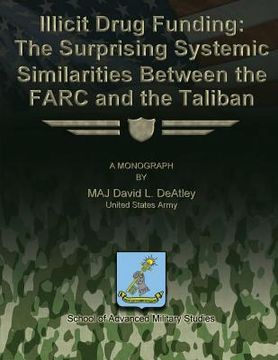Illicit Drug Funding: The Surprising Systemic Similarities Between the FARC and the Taliban
Synopsis "Illicit Drug Funding: The Surprising Systemic Similarities Between the FARC and the Taliban"
The preponderance of literature and scholarly debate on counterinsurgency (COIN) focuses on the strategic or operational approach: leader-focused; large group-focused; special operations; conventional operations; enemy centric; and the latest, population-centric. While the criticism on the latter approach accuses it of plagiarizing work on the subject written in the 1960s, the current debate may result in distraction from how to effectively do long-term damage to insurgent groups. There is a relatively small conglomerate of scholarly work that focuses on the illicit sources of funding for insurgencies. More to the point, this work addresses the commonalities of this type of funding among seemingly disparate insurgent groups. In a November 2009 interview with the author, Professor Diana Marcela Rojas, an international relations expert and professor at the National University of Colombia states, "There's an availability of this illegal resource that these illegal armed groups take advantage of that explains their military strength and as such their strategy of territorial control [Translated from Spanish by the author]." Dr. Camilo Echandía, a professor of economics and expert in conflict studies at the Externado University of Colombia comments to the author, also in November of 2009, "I believe the guerrillas (FARC) are very tied to cocaine despite their military withdrawals of the last 5, 6, 7 years." Gretchen Peters describes in the introduction of her recent book Seeds of Terror: How Heroin Is Bankrolling The Taliban And Al Qaeda, "an explosion of poppy farming across southern Afghanistan." Noteworthy is that Ms. Peters writes "The definition of a Taliban member and drug smuggler is blurring" and goes on to coin the phrase "'FARCification'" of the Taliban." Ms. Peters and other notable authors such as Georgetown University's Dr. Vanda Felbab-Brown in are on to something. Most of the recent scholarship may have moved away from, or never focused on, how the arguably two most noteworthy insurgent groups operating today, FARC and the Taliban, finance themselves. This is a crucial knowledge gap because the similarities in how two seemingly completely different insurgent groups came to rely on illicit crop cultivation are startling. This monograph will present case studies on the two groups that details their origins, ostensible reasons for existing, and how both groups came to subsume the cultivation, production, and trafficking of illicit drugs into their organizations. A comparison of the two groups as complex systems as well as the correlations drawn between illicit crop cultivation and the size and strength of both groups will underscore this. Illicit drug funding is not simply a functional effort that is subordinate to the COIN approach "du jour." Any serious study of how to defeat these two groups absolutely must consider leveraging what has become both groups' primary source of financing against them.

